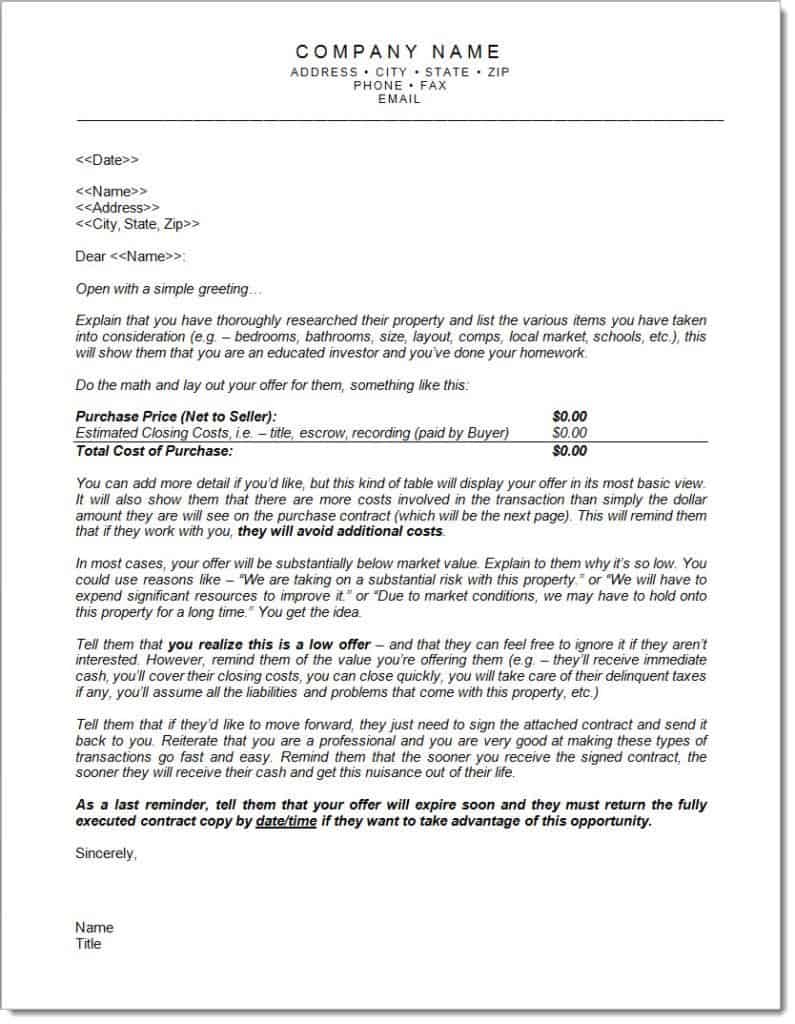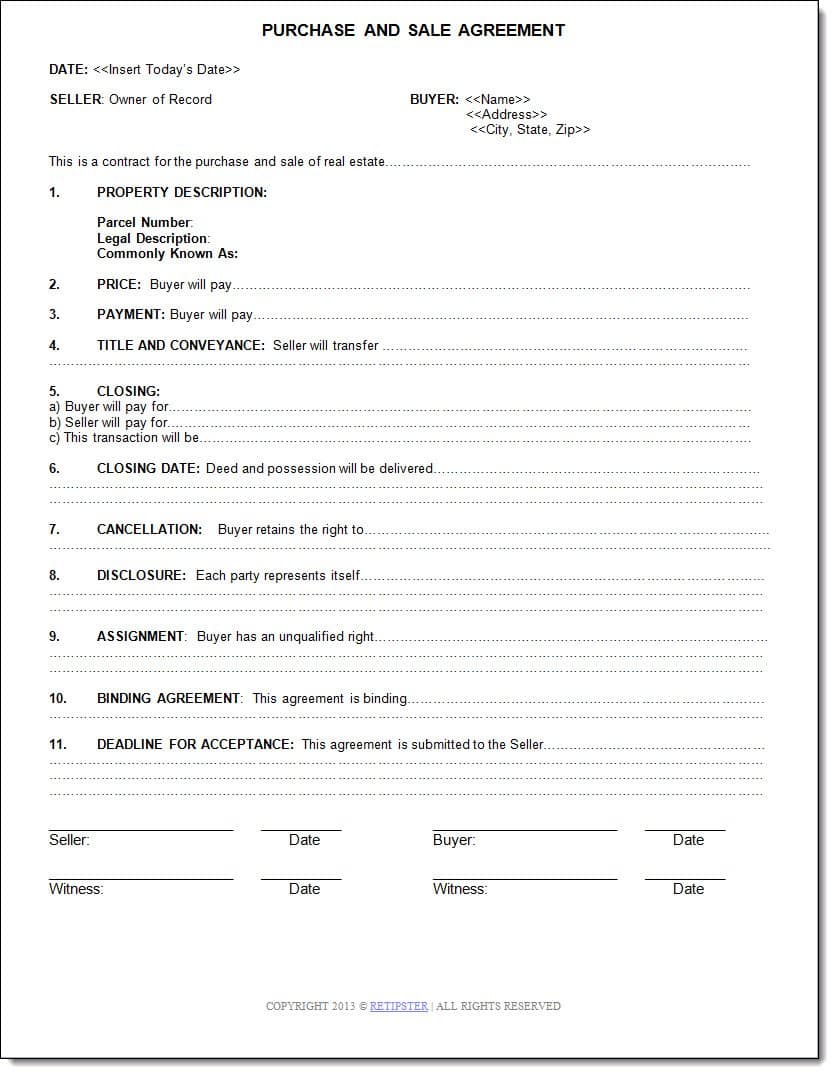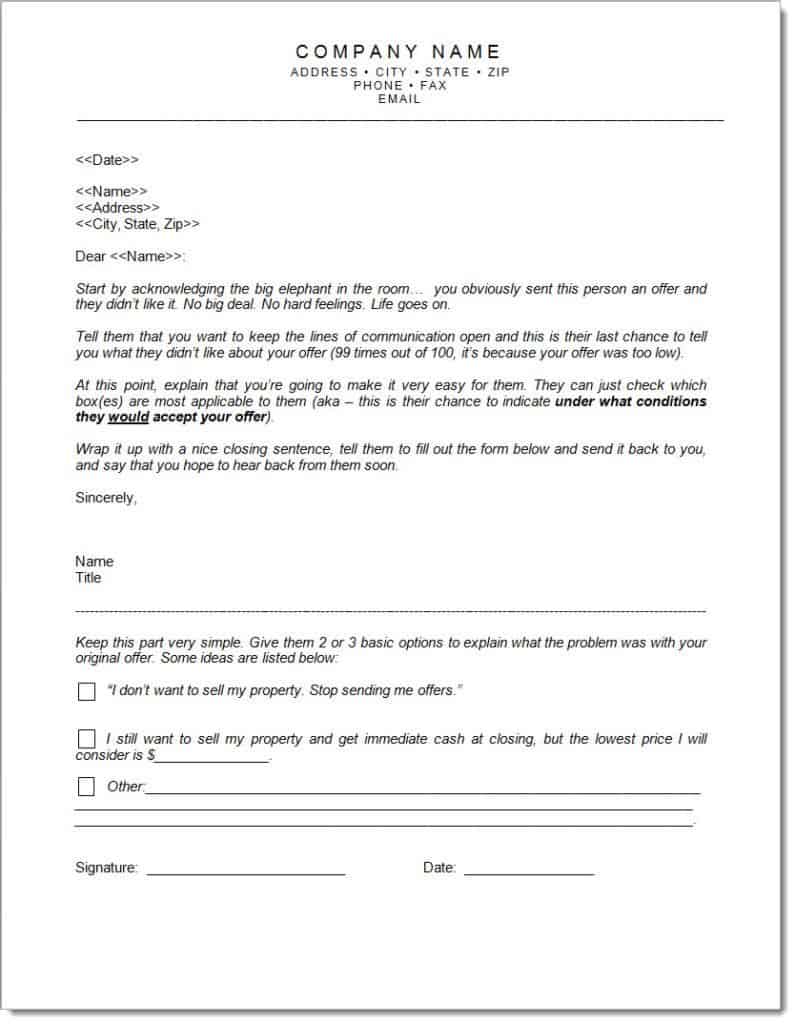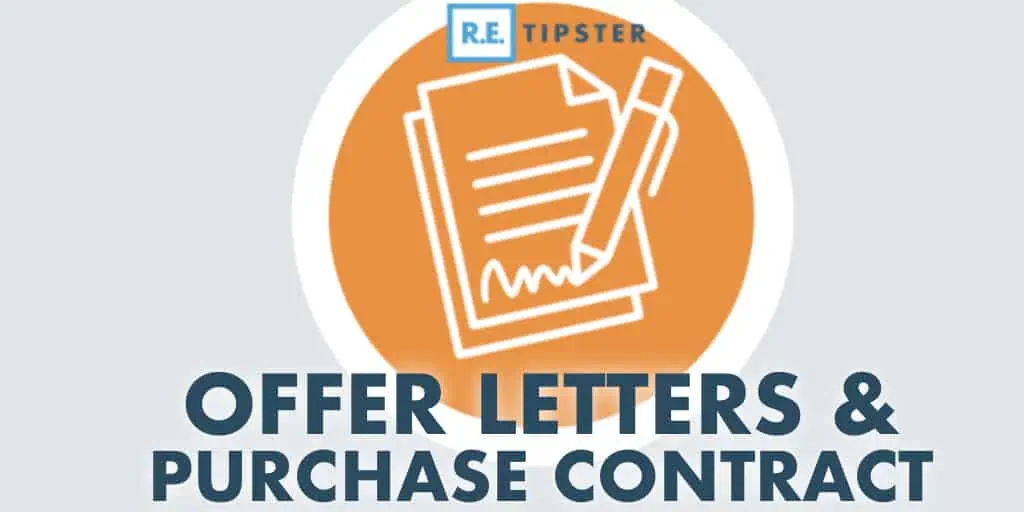
REtipster does not provide legal advice. The information in this article can be impacted by many unique variables. Always consult with a qualified legal professional before taking action.
When I send a written offer to buy a property directly from the owner, I try to keep things simple and straight to the point.
Over the years, I’ve used three different templates to handle this:
- A one-page cover letter
- A one-page purchase agreement
- A one-page follow-up letter
These three documents have become some of the most important tools in my offer-making process, and for good reason.
Simplicity Is King
The reality is that 99% of the people you'll be making offers to are not real estate professionals. They aren't trained to scrutinize a contract and understand the ins and outs of the “legalese” in painstaking detail. The average boilerplate contract can be confusing and complicated. Have you ever wondered why some lawyers can charge $500+ an hour to interpret these documents for the average person?
It's because they're overly convoluted to begin with.
For example, look at this page below and tell me what comes to mind:
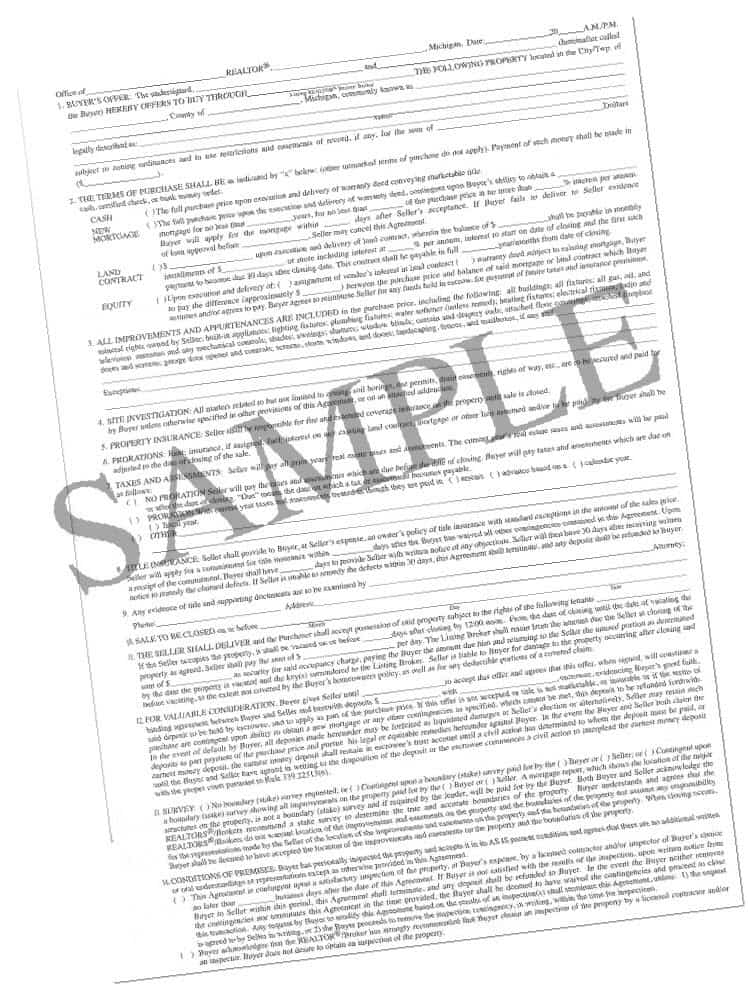
When I see a document like this (along with the 23 pages behind it), my mind starts shutting down.
It’s overwhelming and intimidating, especially if you aren’t familiar with the contract (and so does, I suspect, 99.99% of the population). Who knows what mysterious, complicated, or threatening clauses could be buried here?
Explain It So a Child Can Understand
These days, I make every effort to communicate my offers in a simple, seamless, idiot-proof manner (think middle school reading level).
After making thousands of offers to people over the years, I've learned that if a property owner doesn't understand my intentions, it will make them uncomfortable.
To avoid exposing their incompetence, many will just walk away and look for someone else who will make the process easier. This is an area where many real estate investors miss out on opportunities.
When a seller sees page after page of mind-numbing legal jargon, they will get confused, and a confused mind says “No.”
Writing Offers in 3 Pages
Writing concisely and simply is an area where many real estate investors miss out on opportunities, but this is an opportunity for YOU. I'll show you how to make your offers simple, easy to understand, and easy for people to say “Yes!”
Page 1: Cover Letter
It all starts with making a good first impression.
A cover letter (Page 1 of 3) is vital to your “offer package.” It explains the pertinent details of your proposal in language that anybody with an 8th-grade education could understand.
A good cover letter should explain why the offer is being sent, what costs are involved, and why the recipient should seriously consider accepting the offer. This is a nice way of holding their hand and gently nudging them toward saying “Yes” to your proposal.
(Note: This example below doesn't contain the exact verbiage of my cover letter, but if you want more information on the specific words I use, you can get my word-for-word template at the bottom of this blog post.)
A simple, one-page cover letter is crucial to explaining your offer's basic details. It will help the average person see past any confusion they might have, regardless of what your purchase contract looks like.
RELATED: How Much Should You Offer For That Property?
Page 2: Purchase Contract
In my experience as a commercial banker and real estate investor, I've seen purchase contracts over 50 pages long. I'm not kidding!
Depending on the complexity of the deal, which attorneys are involved, and several other factors, a purchase agreement can be a ridiculously complicated document. This may make sense for a multi-million dollar commercial real estate transaction, but the truth is, that's rarely what I'm dealing with.
In most cases, I'm going after some pretty modest deals. My offers will include straightforward terms:
- There is no financing involved.
- It's a cash sale.
- I am buying the property as-is (accepting any/all pre-existing issues).
- The property owner has anywhere from one to 10 days to accept the offer.
- The deal needs to be closed within 30 days, in most cases.
- If the seller fails to disclose something to me, I can back out of the transaction anytime.
That's pretty much it.
So what does this kind of contract look like? Here's a basic outline (note: you can get a copy of my actual contract at the bottom of this blog post):
If you're making offers this basic, you don't need to include paragraph after paragraph of legal “fluff” that has nothing to do with your offer.
Make It Relevant
If you've looked through one of these “standard” purchase agreements, you may have noticed that most of the language is completely inapplicable to your specific offer.
Why? Because the whole point of these “standard” contracts is to include as much boilerplate language as possible, so the contract can be used in as many different scenarios as possible.
Of course, this is great for real estate agents (because they don't need to re-create the wheel with every deal they close), but it doesn't serve your purposes very well, especially when you're trying to steer clear of confusion and keep your offer simple.
A one-page contract is significantly less intimidating for the recipient.
Think about it: what goes through your mind when you start thumbing through a 12-page contract vs. a one-page contract? Which one causes you to ask more questions, causes your subconscious defense mechanisms to kick in, or numbs your mind with confusion?
When I designed my contract, I wanted to include ONLY the most essential, relevant items that actually mattered in the real estate transaction. My goal was to keep out the bulk of the confusing terminology because it only served to cloud the minds of the average recipient.
RELATED: How to Avoid the Guilt Trip When Sending Low Offers
What About Wholesaling? Is This Contract “Assignable”?
YES.
I included section “9. Assignment” in this contract, which contains the necessary language to make this purchase contract fully assignable. This means I can use it for wholesaling if or when I need to (e.g., selling the contract to a third-party buyer without ever taking ownership of the property myself). It's a nice feature to have, and I've been able to use it on several occasions by assigning this type of contract to other investors when I don't want the hassle or liability of owning it myself.
Page 3: Follow-Up Letter
Sometimes or for some reason, the seller might not always respond to a written offer (either they get cold feet or they somehow didn't receive my original purchase agreement). The “follow-up letter” is my last attempt at catching some sellers who may be on the fence about selling their property.
If you're making offers the way I am, there will inevitably be some purchase agreements that just don't get accepted. Finding amazing deals is a numbers game. When people don't respond or respond negatively, rather than just ignoring them and moving on, a simple letter like this keeps the doors of communication open with the property owner.
This is our last chance to determine why the seller didn't accept the initial offer. And to see if there's any chance we can agree on a mutually acceptable sale price.
Here's an example of how you could put this kind of letter together (note: if you want a copy of my exact follow-up letter, it comes along with the Contract Package at the bottom of this blog post):
In my experience, this letter has resulted in deals getting closed about 20% of the time, when the discussion would have otherwise just been finished).
It's not always effective, but it's usually worth the extra effort to follow up with people if you want to chase down a property owner on a great opportunity. You just never know when this extra communication will motivate a person to keep their mind open about accepting your offer.
RELATED: The Only 3 Things You Need To Make An Offer (It's Easier Than You Think!)
ProTip: Use Electronic Signatures
If you establish a line of communication with the other party via email, you could easily make this purchase agreement accessible digitally. You can upload it to a digital signature service and allow the other party to execute the agreement from their phone or computer.
If you establish a line of communication with the other party via email, you could easily take this purchase agreement, upload it to a digital signature service, and allow the other party to sign the agreement from their phone or computer.
Several services can help you with this. In the past, I've used PandaDoc, and it got the job done, but it was an extra annual expense, and it took a bit of work to map out the fields of each contract I sent out.

What Should Your Contract Say?
As you can see, the examples above are meant to show you the format of my letters and contract, but not the exact wording. I do this for a couple of reasons:
1. You may very well be a better writer than me. I don’t want to imply that my letters are the most persuasive pieces ever written. I've had a lot of success with them, but you can go in many different directions when composing written communication. Don't be afraid to get creative and test some of your own writing out—and if you start getting a higher rate of acceptance—let me know!
2. I'm not an attorney, and this post SHOULD NOT be construed as legal advice. I paid one of my local attorneys to create the contract I use. In my experience, it has been widely accepted by closing agents all over the United States (probably because of how basic it is, without reference to any state-specific items).
A purchase contract doesn't have to be wildly confusing. The terms of my offers are always very simple. As a result, my contract doesn't include all the extra, pointless legal boilerplate that doesn't even apply to the projects I'm working on.
I'm willing to bet that if you work with your attorney to create a contract that's clean, concise, and to the point, you might find yourself with a few more acceptances than you're accustomed to. It will probably cost a few hundred bucks, but if that's what you need to do to take your offers to the next level, what are you waiting for? We're talking about a HUGE upside potential for more revenue here!
Want to Use My Letters and Contract?
If you want to use the ideas above to develop your version of a cover letter, purchase contract, and follow-up letter, go for it!
It may cost a few hundred dollars and take time to refine your documentation, but I have no doubt you can do it. It's not difficult, but it does take a bit of time and mental energy.
On the other hand, if you'd rather cut to the chase and get started using the exact templates I use, you are more than welcome to get immediate access to my versions of these documents below. Note that this package includes a short video tutorial explaining all the technical details about filling out this contract correctly.
Whatever you decide to do, I appreciate you taking the time to check out this blog post, and I wish you all the best as you continue to send out offers. Keep up the great work!
Note: When you sign up as an REtipster email subscriber, I’ll send you an instant $20 off “discount code” for this item, and if you enroll in the Land Investing Masterclass, you'll get access to this item for FREE. There's no pressure, of course; I just want to make sure you're aware.








